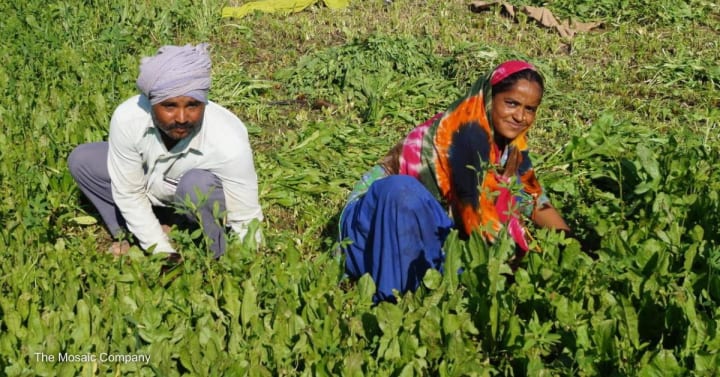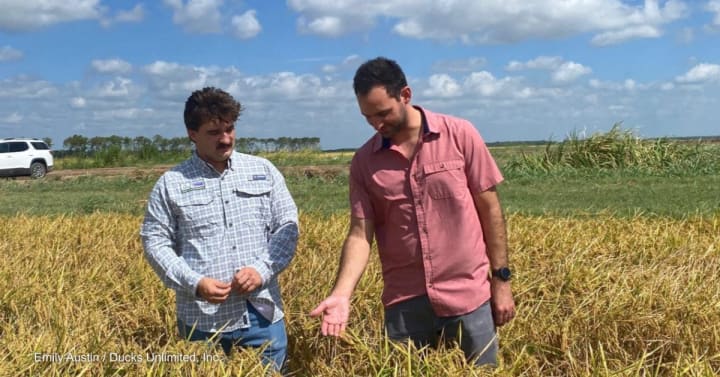
When it comes to advancing sustainable agricultural practices, getting the most out of scarce resources, such as water and land, is critical. The same is true for the foundations dedicated to this same cause.
“We realize that in a resource-scarce world, we can't fund every program in the world,” said Ben Pratt, president of the newly relaunched Mosaic Company Foundation for Sustainable Food Systems. “For us, it really comes down to education.”
For the past two decades, the foundation has worked with its partners to empower farmers in Brazil, India, and the United States with the tools and knowledge they need to achieve agricultural self-sufficiency. Prioritizing measurable impact in these specific regions has allowed the foundation to multiply the positive effect of its funding, Pratt explained.
“We want to help smallholder farmers access and use inputs, soil, and water efficiently and sustainably,” said Pratt, who also serves as the vice president of public affairs for The Mosaic Company. “Then, we want to move on to other farmers in the same regions so we can have a much more broad-based impact.”
As the foundation enters its next phase, it is sharpening its focus on farmer-led initiatives to increase yields, bolster soil health, and protect water.
“We're going from a sort of broad-based corporate foundation that would consider funding a wide range of things to really honing our focus on this single strategy,” Pratt said of the foundation’s relaunch. “I would say it's an evolution,” he added. “The foundation has been around for 20 years, and this represents a progression of that important work.”
Speaking to Devex, Pratt explained how the foundation plans to build on its previous successes to maximize its impact in the sustainable agriculture space.
This conversation has been edited for length and clarity.

What has the foundation achieved so far that gives you hope for further success moving forward?
Our foundation’s been around for about 20 years, and we’re very proud of the work we’ve done in many regions of the world. One of our most proud accomplishments is a program in India, the Krishi Jyoti project. It means “enlightened agriculture.” We work with a third party there, the Sehgal Foundation, and it’s not too much to say that we have fundamentally improved hundreds of thousands of lives in India.
We’ve done that by going into villages where people have been farming the same very small plots of land for many generations without sufficient inputs, without sufficient water, and we train them to apply and use them efficiently. This has boosted yields by 35% and transformed entire communities.
One of the first sets of these farmers I met about a decade back came to an event we had just a couple of years ago — and he is proof the program has worked. The cohort of farmers is sustainable, self-sufficient, and productive, feeding their families and selling some of what they produce for income rather than falling far below formerly subsistence-level farming. And that's incredibly gratifying to see thousands and thousands of farmers who have gone from not being able to live with what they produce to being very productive and staying that way for the long term.
What are the biggest lessons the foundation has learned so far from working with its partners to advance sustainable agricultural practices?
One is that long-term, committed partnership is key. We can provide funding, and we can be there to help with agronomic expertise and people, but we need third-party NGO partners who can bring the whole thing together and be boots on the ground for us.
The most important thing about measurable, meaningful, and growable impact for us is this ability to go to a specific place, spend a couple of years with farmers in that area, training them and improving their infrastructure. After bringing them to a level of self-sufficiency, we can reinvest program resources with their neighbors. We’re not perpetually funding the same few people, but multiplying the impact of our limited resources to transform entire communities.
Are there any unique challenges facing farmers in each of the regions you work in?
In India, where there are something like 300 million farmers — there are almost as many farmers in India as there are people in the United States — and they, by and large, farm very small plots of land. They need access to education, credit, inputs, and most of all, especially in this climate change-impacted world, they need water. Water is a scarce resource in many parts of India where the summer temperatures are getting into 120 [degrees] Fahrenheit [and above] these days.
In Brazil, a lot of people who know about agriculture think of Brazilian farmers as these megafarmers who have 200,000 hectares of land. However, there are also a lot of smaller farmers who are significantly disadvantaged against those much larger peers, and they need the same kinds of access I mentioned.
Then, in the U.S., it's a different model for us. Farmers recognize that food security also relies on soil health and nutrient stewardship. We want to make sure that farmers get the most value out of the products they use by optimizing nutrient use efficiency and protecting top soil from erosion. The foundation’s leadership in [the] 4R Nutrient Stewardship [framework] funds technical assistance to increase capacity, and expands best practices in nutrient use efficiency to 10 million acres.
How can the next generation of farmers be equipped with what they need to lead on best sustainable agriculture practices?
First of all, we need farmers, and we need to make farming an appealing business and an appealing lifestyle. This isn’t [only] beneficial for us — it's for everybody around the world. We need younger people, kids growing up on farms, to see that what their parents are doing is an appealing way of living and they can make a good living at it. So that's the first thing we really need to keep attracting people to farming. The only way to do that is to make sure current farmers are successful.
That’s why for the foundation, we are really focused on educating current farmers, and helping to make sure that as many farmers as possible around the world have access to all the information and innovations they need to be as productive as they can be. Then, while we're doing that, we should educate them about the necessity of good environmental stewardship.
Keep in mind the world needs its food system at large to grow and be more productive and sustainable because the U.N. still expects us to have 9 billion people on this earth by 2050. And we can't bring a lot more land into agricultural production because you can't deforest land as a primary means of achieving food security and still meet global climate goals. So we need the land that is there to be maximally productive, and that’s what we’re hoping to focus on through the foundation with particularly disadvantaged farmers around the world.




